Back to blog
7 MIN READ
What Is Churn Rate and How Do We Calculate It?
PUBLISHED
19 December, 2023

Product Analytics Expert
When users stop using your app, they’ve “churned”. Churn rate is a metric that tracks the occurrence of churn and allows you to develop apps that lead to less churn.
It’s a core component of any retention strategy.
In this guide, we’re doing a deep dive into the churn rate metric. We’ll cover benchmarks, formulas, and strategies that have helped many of the businesses who use UXCam to reduce churn and build stickier products.
Let’s dive in.
What is churn rate?
Churn rate is the percentage of users who stop using your product over a given period.
It’s a simple (but highly effective) way to measure the success of your product, since it tells you how many people you’re losing over a given period. This can easily be translated into a range of insights into:
Growth trajectories
The effectiveness of marketing campaigns
Product features that need improvement
User engagement levels
Metrics like the churn rate enable you to track and measure success, so you can optimize your product accordingly. It also helps to make sure that users stay engaged with your product over a longer period of time.
With UXCam’s analytics platform, you can easily monitor churn rates in real-time, enabling you to take swift action when needed. By constantly monitoring churn rates and user engagement levels, you can improve customer retention strategies and create stickier products.
How To Calculate Churn Rate
To calculate churn rate, you’ll need three data points:
Total number of customers or users at the start of the period.
Total number of customers or users at the end of the period.
Total number of new customers or users at the end of the period.
These three measurements then get plugged into a simple formula:
Churn Rate = (Total Customers or Users at End of Period – New Customers or Users at End of Period) / Total Customers or Users at Start of Period
For example, if you had 1,000 customers at the beginning of a week and 1,200 customers at the end of that same week with 250 new customers added, your churn rate is:
(1,200 – 250) / 1,000 = 0.15 (or 15%)
Note: Subtracting new customers and users is important because it separates growth from churn. If we didn’t do this, businesses that are growing would (counterintuitively) appear to have higher churn rates than stagnant or shrinking businesses. Remove new customers from the example above, and we get a churn rate of 120%.
What is a good churn rate?
Industry professionals generally agree that an annual churn rate of 5% to 7% is a good range for most businesses. However, it’s important to note that a good churn rate for your business may be lower or higher than this range, depending on your industry and business model.
In the mobile app industry, a source reports that most mobile app users (80%) stop using the app within three months. The global average retention rate of mobile app users after three months was 29%, meaning a 71% churn rate. Retention rates tend to decline around the first and fourth weeks.
Different apps and industries may have different standards for a good churn rate. However, a lower churn rate is always preferable. For example, a subscription-based app may aim for a churn rate of 5% or lower.
Practical strategies to reduce churn rates quickly
Personalize onboarding
Improve your product
Focus on delivering great UX
Develop a loyalty program
Use a product funnel to analyze churn
1. Personalize onboarding
It’s essential to understand the unique needs and preferences of different segments to deliver a personalized onboarding experience.
By tailoring the onboarding process based on factors like user behavior, demographics, and usage/purchase patterns, businesses can effectively guide users to the most valuable features and functionalities of their product or service. This accelerates the time to value and fosters a stronger sense of connection and satisfaction among customers.
UXCam is a mobile app analytics tool that helps you understand how users interact with your app.
With UXCam's segmentation feature, you can easily identify patterns and trends among your users. For example, you can segment users based on their location, device type, or app usage patterns. This allows you to design targeted onboarding flows that emphasize the essential steps and features to get them there.
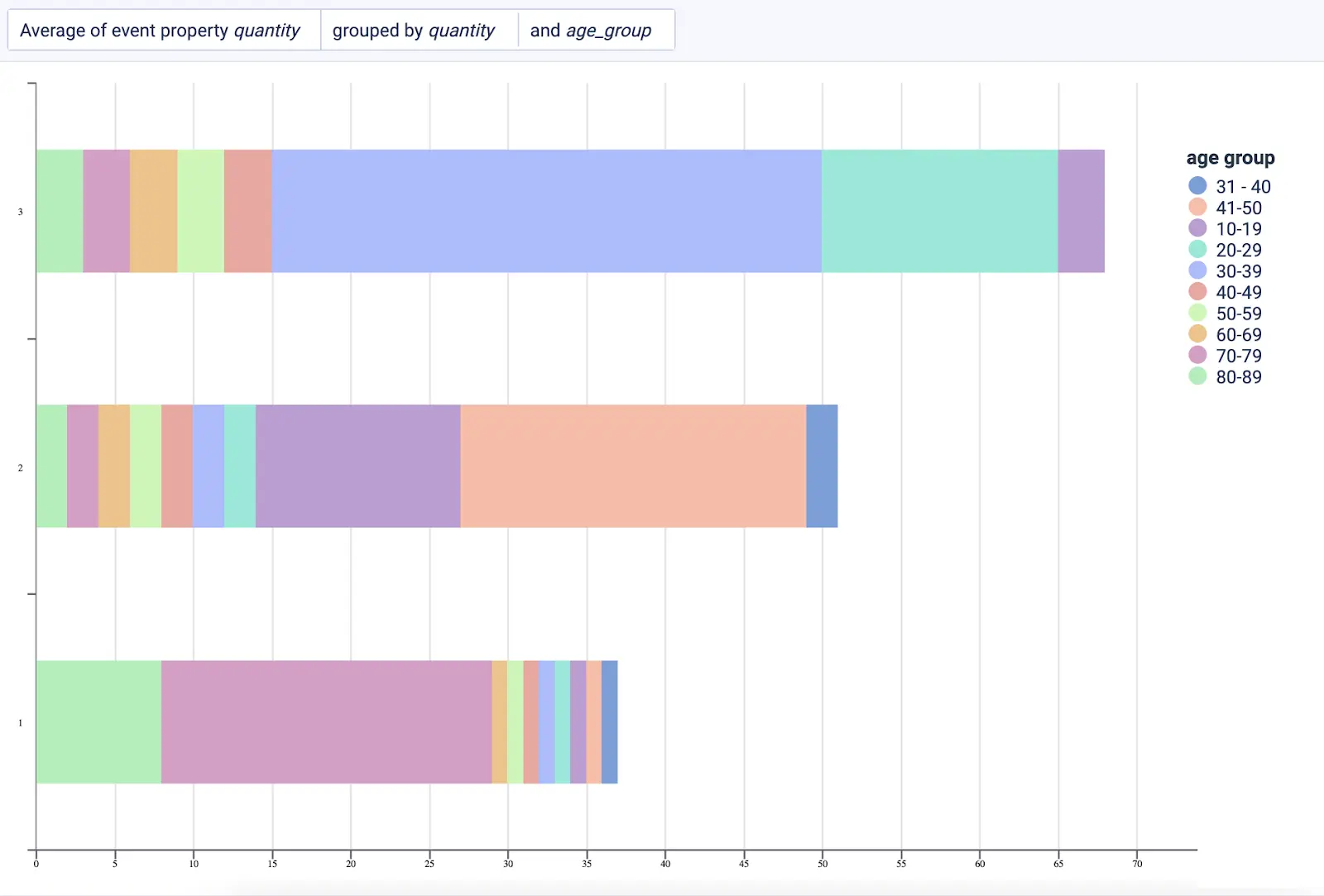
UXCam offers ready-made segments that you can instantly use for analysis. You can also create your own segments to explore particular user groups in more detail.
2. Improve your product
Analyzing the reasons for customer churn and improving your product can help reduce the churn rate. Consider conducting customer surveys and analyzing customer feedback to identify pain points and areas for improvement. By understanding why customers are leaving, you can make targeted enhancements to your product or service that address their concerns and increase customer satisfaction.
JobNimbus, a CRM and project management software for contractors, for example, faced a high churn rate and a 2.5-star app store rating due to a poorly designed app that wasn’t meeting user needs.
To address this, they rebuilt their app, focusing on understanding user pains and challenges. They implemented UXCam to gather both quantitative and qualitative data for informed decisions.
JobNimbus used UXCam to track metrics like user feature adoption, monthly active users, cash-free sessions, and device model distribution. This data was used to measure progress and track KPIs daily. Plus, by identifying which OS to support based on UXCam device data, JobNimbus planned to stop supporting older versions once user numbers were below a fixed threshold, reducing development and maintenance expenses.
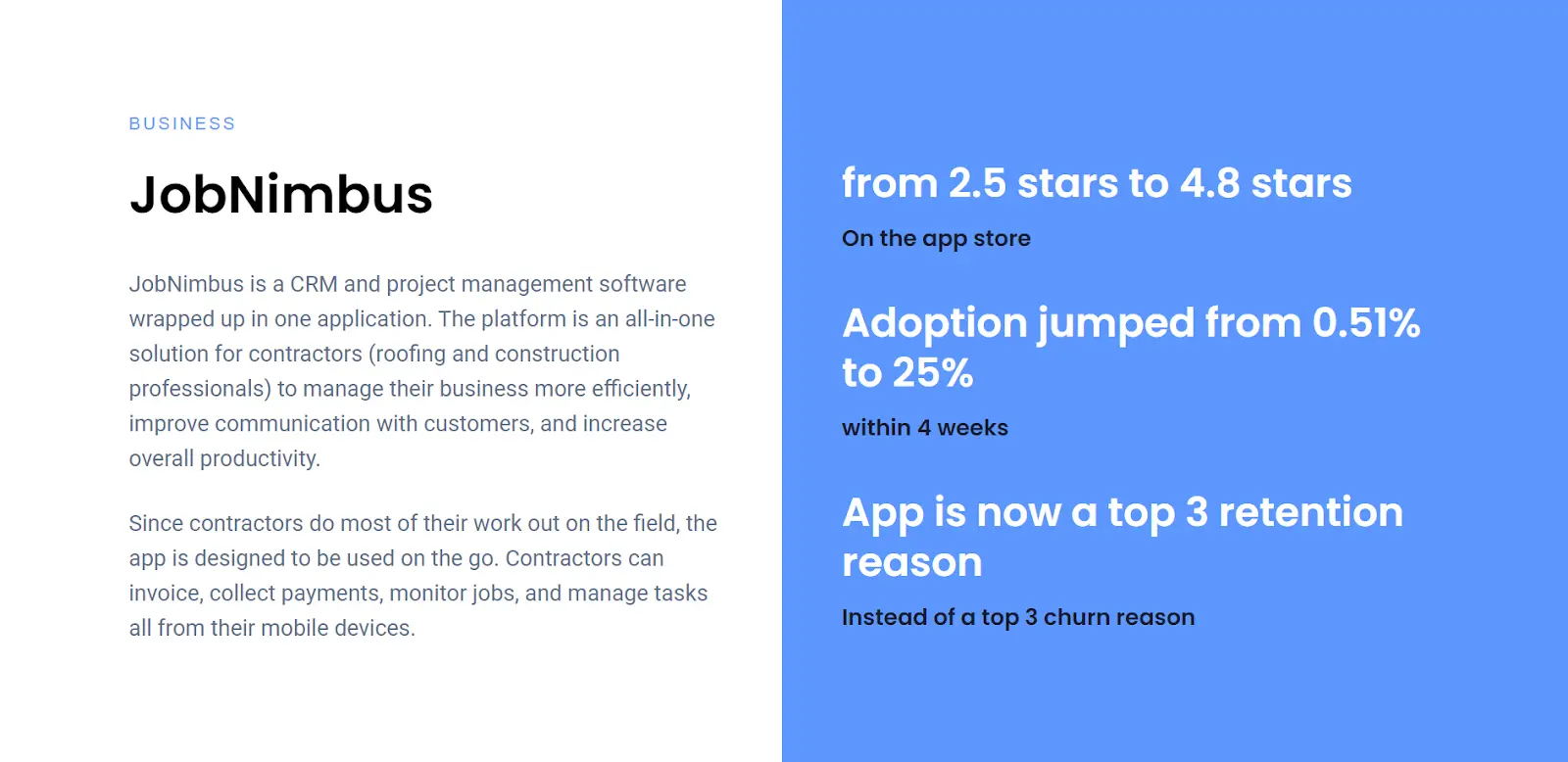
UXCam showed a significant increase in the adoption rate for a mobile app feature, leading the team to change their product roadmap and prioritize releases effectively. Adoption of the app jumped from 0.51% to 25% within just four weeks, making it a top three retention reason instead of a churn reason.
3. Focus on delivering great UX
By anticipating the needs of your customers and addressing any issues before they escalate, you can stop churn before it happens.
For example, Brainspace used UXCam to understand why users cancel their subscriptions and how they can restructure the process to mitigate churn. They reviewed the cancellation steps users took to terminate their subscriptions and identified the top reason for recent users’ cancellations.
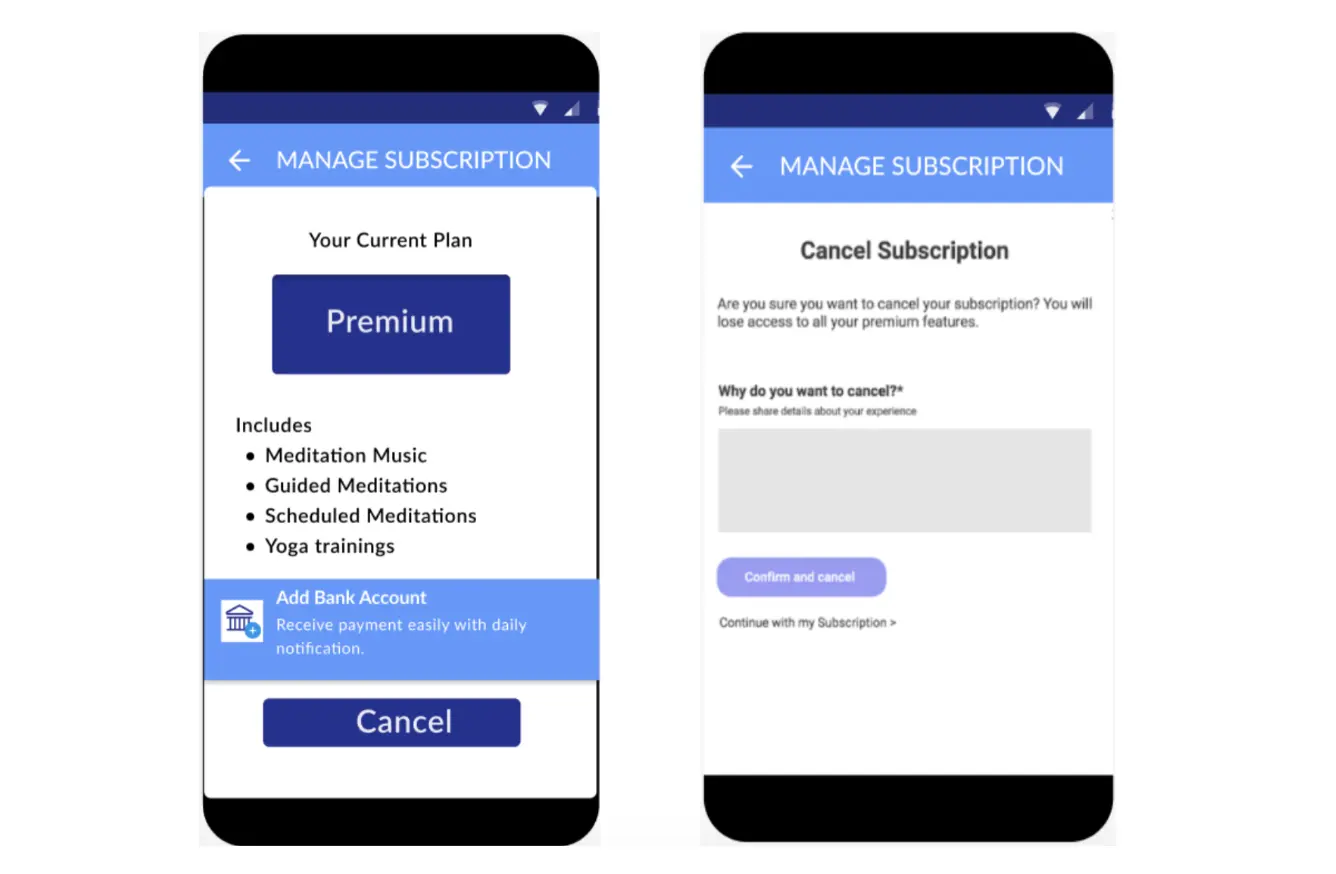
The team found that “Too_Expensive” was the main reason for cancellation. They also discovered that most users canceled after trying to play a featured guided meditation video, which was not playing at all.
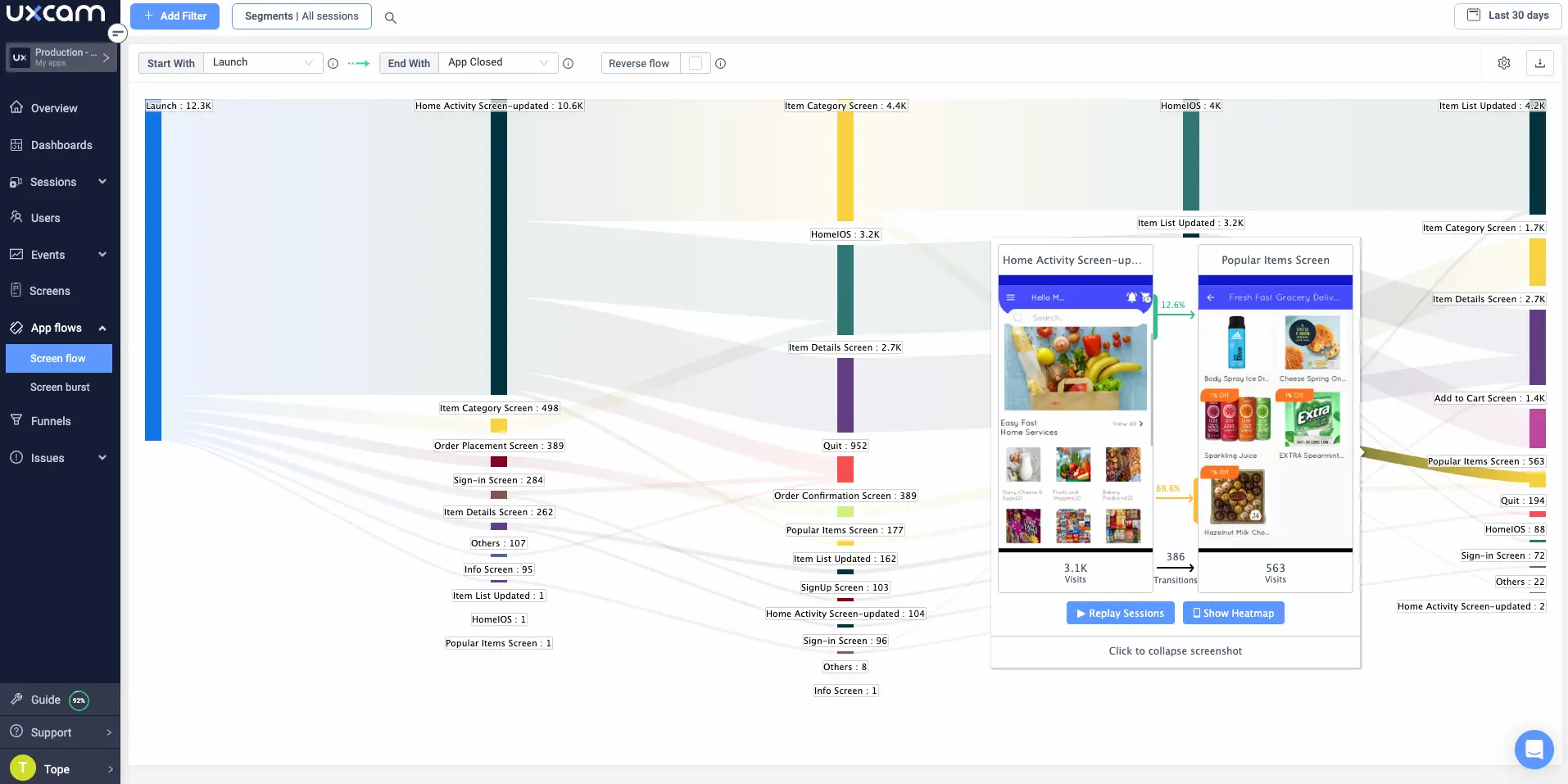
In UXCam’s screen flow, the team added “rage taps” or “crashes” as filters within sessions to identify patterns such as the number of rage taps, frequent crashes or UI freezes, common devices or platforms, etc. The team saved this filter as a segment and applied this segment to different areas of UXCam.
4. Develop a loyalty program
Developing a loyalty program can help reduce churn rate by incentivizing customers to stay with your business. There are several key steps to consider when developing a loyalty program. First, you need to understand your customers and their preferences. Conducting market research and analyzing customer data can provide valuable insights into what incentives and rewards would be most appealing to your target audience.
Next, determine the structure of your loyalty program. Will it be based on points, tiers, or a combination of both? Points-based programs allow customers to accumulate points with each purchase, which can later be redeemed for rewards. Tier-based programs, on the other hand, offer different levels of benefits based on a customer's spending or engagement level.
Once you have determined the structure, you need to decide on the rewards you'll offer. These can range from discounts and freebies to exclusive access to events or personalized experiences. It's important to choose rewards that are relevant to your customers and align with your brand.
5. Use a product funnel to analyze churn
A product funnel can be a powerful tool for analyzing churn within a mobile app. By mapping out the user journey from download to engagement and retention, app developers can identify specific stages where users are dropping off and address the underlying issues. Understanding where and why users are churning can help developers implement targeted strategies to improve retention rates and ultimately increase the app's success.
UXCam’s funnels feature allows you to see where users drop off and identify the most common paths users take through your app. This helps you identify pain points and areas of friction in your app that may be causing users to churn.
You can even let UXCam recommend funnels for you.
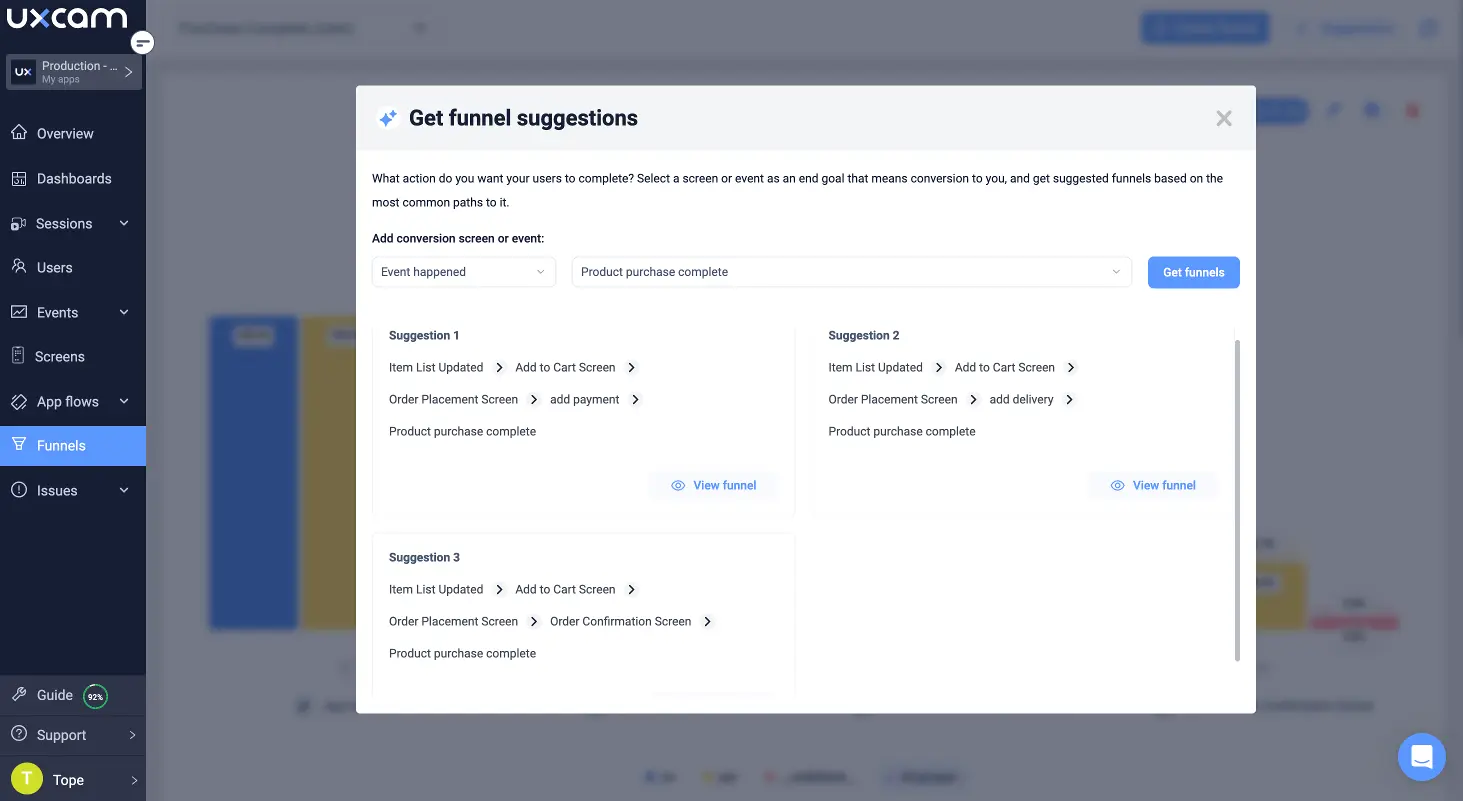
By using UXCam to understand user behavior quickly, you can increase conversions, improve key metrics, drive engagement, create a sticky product, and resolve issues effectively. UXCam has helped many companies reduce churn rates by providing insights into user behavior and experience.
Conclusion
Churn rate is an important metric for any mobile app development team that wants to retain its users and grow its revenue. It measures how many users stop using an app over a given period of time. A high churn rate indicates that something is wrong with the user’s experience, satisfaction, or loyalty.
At UXCam, we arm mobile product teams with the data and insights they need to effectively reduce churn through improved user experience. From understanding user behavior quickly to increasing conversions, UXCam can help you improve key metrics, drive engagement, create a sticky product, and resolve any issues that are causing users to leave your app.
Try UXCam now and get the data you need to reduce your churn rate today!
You might also be interested in there;
How to measure, analyze, and reduce app churn
How to increase mobile app retention: ultimate guide
Mobile app retention benchmarks by industries
AUTHOR

Tope Longe
Product Analytics Expert
Ardent technophile exploring the world of mobile app product management at UXCam.
What’s UXCam?
Related articles
Session Replay
Mobile Session Recording: Our Complete Guide (+Tools)
Learn what mobile session recording is, why it matters, and the best tools to analyze user behavior. See how UXCam helps improve app and web...

Annemarie Bufe
Product Analytics Expert
Product Management
18 Best Product Development Software for Every Team 2026
Discover the 14 best product development software tools to streamline collaboration, track progress, collect feedback, and build better products...

Tope Longe
Product Analytics Expert
Product Management
13 Best Product Management Tools 2025 & When to Use Them
Find out the top tools that the best product managers use daily to perform better at...

Jane Leung
Product Analytics Expert
